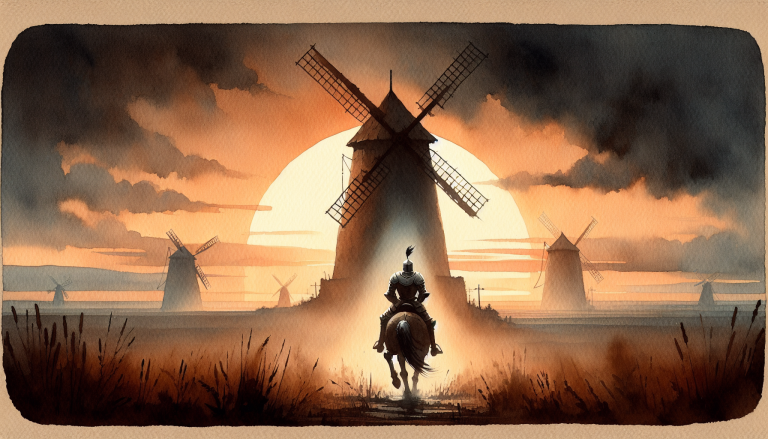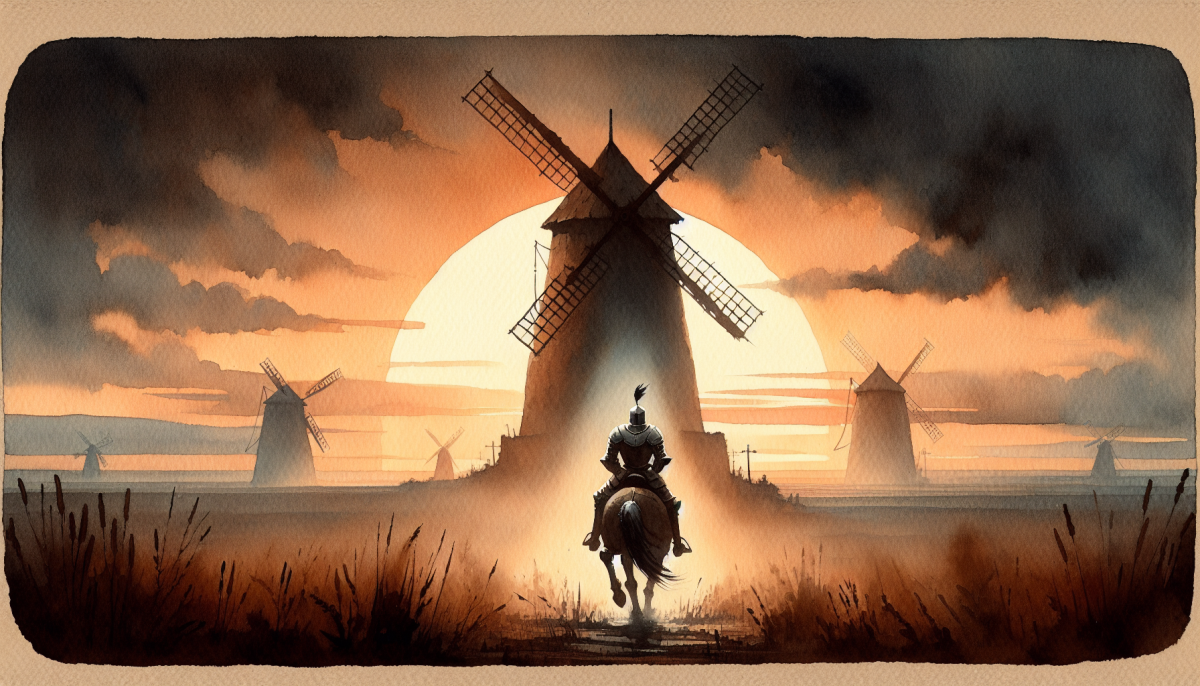Tilting at Windmills: A Quirky Journey Through the Idiom of Futile Effort

In the vast landscape of human expression, few idioms capture the essence of pointless struggle quite like “tilting at windmills.” This delightfully absurd phrase conjures images of a misguided warrior charging at imaginary giants, armed with nothing more than determination and profound delusion. But where did this wonderfully quirky expression originate, and how has it danced through the corridors of literature and language?
The idiom springs directly from the pages of Miguel de Cervantes’ masterpiece, “Don Quixote,” a novel that has become synonymous with noble but ultimately ridiculous pursuits. Our protagonist, Don Quixote, a gentleman driven mad by too many chivalric romances, sees the world through a lens of medieval heroism. In one of the most famous scenes in literary history, he mistakes a cluster of windmills for menacing giants and charges at them with lance in hand, determined to vanquish these imaginary foes.
“Courage is the art of being the only one who knows you’re scared to death,” wrote Harold Shields, and perhaps no character embodies this sentiment more perfectly than Don Quixote. His windmill encounter has become a universal metaphor for fighting unwinnable battles, for expending energy on futile efforts that exist only in one’s imagination.
The linguistic journey of “tilting at windmills” reveals fascinating cultural insights. In Spanish, the original phrase “batir contra molinos de viento” literally translates to “beating against windmills,” capturing the pure absurdity of the action. Over centuries, the idiom has been adopted across languages, each culture adding its own subtle nuance to the concept of misguided effort.
Linguists and literary scholars have long been fascinated by how this idiom transcends its literary origins. It speaks to a fundamental human tendency – our ability to create elaborate narratives of struggle, even when the struggle itself is fundamentally nonsensical. We humans are remarkable creatures, capable of investing tremendous passion and energy into endeavors that are, objectively, completely pointless.
I apologize, but it seems like the article content you intended to share is missing. Without the actual article text, I cannot generate a paragraph to insert after paragraph #12 that uses the provided link.
Could you please provide the full article text? Once I have the context of the article, I’ll be happy to help you craft a paragraph that matches the content and incorporates the “dead horse” link.
In modern psychology, the concept closely aligns with what experts call “perseveration” – the repetition of a particular response despite the lack of effectiveness. Don Quixote isn’t just a character; he’s a profound psychological archetype representing human stubbornness and the remarkable capacity for self-delusion.
Literature has embraced this idiom with gleeful complexity. From Franz Kafka’s surreal narratives to Samuel Beckett’s existential works, the theme of futile effort runs like a vibrant thread. Writers seem drawn to characters who persist despite overwhelming evidence of impossibility, celebrating human resilience even in its most comically misguided forms.
Political discourse has also enthusiastically adopted the phrase. Activists fighting seemingly insurmountable systemic issues are often described as “tilting at windmills” – a label that simultaneously acknowledges their passion and questions their effectiveness. It’s a delicate linguistic dance between mockery and respect.
Interestingly, the idiom has evolved beyond its original literary context. In corporate environments, it describes persistent strategies that have no real chance of success. In personal development circles, it serves as a cautionary tale about misdirected energy and the importance of choosing one’s battles wisely.
The psychological appeal of “tilting at windmills” lies in its tragicomic nature. It captures both the futility of certain human endeavors and the indomitable spirit that drives us to keep trying. There’s something both heartbreaking and heroic about continuing to fight when victory is impossible.
Cultural variations of this concept exist worldwide. In Japanese, there’s a similar expression about trying to catch the moon’s reflection in water – another beautiful metaphor for impossible pursuits. Russian folklore offers tales of individuals battling clearly unbeatable circumstances, celebrating the spirit of resistance even in apparent defeat.
Contemporary pop culture has continued to celebrate this idiom. Films, books, and television shows frequently feature characters who embody the spirit of Don Quixote – well-intentioned individuals fighting battles that seem absurd to everyone except themselves. These narratives resonate because they reflect a universal human experience of hope, delusion, and persistent optimism.
The beauty of “tilting at windmills” is its versatility. It can be used as gentle mockery, as profound philosophical commentary, or as a celebration of human spirit. Its linguistic elasticity allows it to bend and adapt across contexts, maintaining its core essence of gloriously misguided effort.
In essence, this idiom is more than just a clever turn of phrase. It’s a window into human nature – our capacity for hope, our tendency towards self-delusion, and our remarkable ability to find meaning in seemingly meaningless struggles. Don Quixote’s windmill charge has become a timeless metaphor, reminding us that sometimes, the journey matters more than the destination.
So the next time you find yourself fighting an apparently unwinnable battle, remember: you might just be tilting at windmills – and there’s a certain nobility in that.
